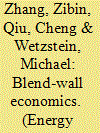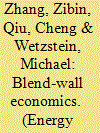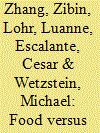| Srl | Item |
| 1 |
ID:
096709


|
|
|
|
|
| Publication |
2010.
|
| Summary/Abstract |
The US Environmental Protection Agency is currently considering a waiver allowing an increase in the fuel-ethanol blend limit (the "blend wall") from 10% (E10) up to 15% (E15). Justifications for this waiver are reduced vehicle fuel prices and less consumption of petroleum gasoline leading to energy security. A theoretical examination of this waiver reveals an anomaly where a relaxation of this blend wall elicits a demand response. Under a wide range of elasticities, this demand response can actually increase the consumption of petroleum gasoline and thus lead to greater energy insecurity. The economics supporting this result and associated policy implications are developed and discussed.
|
|
|
|
|
|
|
|
|
|
|
|
|
|
|
|
| 2 |
ID:
097496


|
|
|
|
|
| Publication |
2010.
|
| Summary/Abstract |
The US Environmental Protection Agency is currently considering a waiver allowing an increase in the fuel-ethanol blend limit (the "blend wall") from 10% (E10) up to 15% (E15). Justifications for this waiver are reduced vehicle fuel prices and less consumption of petroleum gasoline leading to energy security. A theoretical examination of this waiver reveals an anomaly where a relaxation of this blend wall elicits a demand response. Under a wide range of elasticities, this demand response can actually increase the consumption of petroleum gasoline and thus lead to greater energy insecurity. The economics supporting this result and associated policy implications are developed and discussed.
|
|
|
|
|
|
|
|
|
|
|
|
|
|
|
|
| 3 |
ID:
093519


|
|
|
|
|
| Publication |
2010.
|
| Summary/Abstract |
Sorting out the impacts of biofuels on global agricultural commodity prices is impossible without turning to data and distinguishing between the short-run versus the long-run impacts. Using time-series prices on fuels and agricultural commodities, the aim is to investigate the long-run cointegration of these prices simultaneously with their multivariate short-run interactions. Results indicate no direct long-run price relations between fuel and agricultural commodity prices, and limited if any direct short-run relationships. In terms of short-run price movements, sugar prices are influencing all the other agricultural commodity prices except rice. With sugar the number one world input for ethanol, results indicate increased ethanol production is potentially influencing short-run agricultural commodity prices. Overall, results support the effect of agricultural commodity prices as market signals which restore commodity markets to their equilibria after a demand or supply event (shock).
|
|
|
|
|
|
|
|
|
|
|
|
|
|
|
|
| 4 |
ID:
115158


|
|
|
|
|
| Publication |
2012.
|
| Summary/Abstract |
Enhanced environmental quality, fuel security, and economic development, along with reduced prices of blended diesel, are often used as justifications for a U.S. federal excise tax exemption on biodiesel fuels. However, the possible effect of increased overall consumption of fuel in response to lower total prices, mitigating the environmental and fuel security benefits, are generally not considered. Taking this price response into account, the optimal U.S biodiesel subsidy is derived. Estimated values of the optimal subsidy are close to the recently expired subsidy, revealing the subsidy's environmental and security benefits. However, further positive environmental and security benefits from the biodiesel tax-exemption subsidy may be obtained if the subsidy is combined with a federal excise tax on petroleum diesel.
|
|
|
|
|
|
|
|
|
|
|
|
|
|
|
|